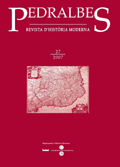Monarquia moderada i llibertat de la pàtria. Notes sobre el pensament polític de l’austriacisme castellà a l’exili
Keywords:
Guerra de Successió d'Espanya, austriacisme, pensament polític modern, mazarinades.Abstract
The analysis of a political work published in exile in Milan by 1716 permits some observations on the political thought of Castilian Austracism, a little known (and misrepresented) aspect of the War of the Spanish Succesion. Its main features were: the defence of monarchical rule as moderated by laws, institutions and estates (in contrast to the tyrannical power embodied by the Bourbons); the intervention of communities, convened in assemblies, in proclaiming the new king in cases of an uncertain succession; the view of Philip V’s accesssion as the culminating moment of Spanish decline; and a justification of opposition to the new dynasty as a defense of the freedom of the fatherland. These principles, that can be seen in the editorial output during the war, bear a significant resemblance to the discourse generated in France, a few decades earlier, by the opposition to Richelieu and Mazarin, that some historians have qualified as a first or embryonic form of political liberalism.Downloads
Published
How to Cite
Issue
Section
License
Copyright (c) 2007 Agustí Alcoberro i Pericay

This work is licensed under a Creative Commons Attribution-ShareAlike 4.0 International License.
Authors must agree with the following terms:
1. The author keeps authorship rights, ceding the journal the right to first publication.
2. Texts will be disseminated with a Creative Commons Attribution 4.0 International License. Which allows for the work to be shared with third parties, as long as they recognise the work’s authorship, the original publication in the journal and licensing conditions.
This requires acknowledging authorship appropriately, providing a link to the license, and indicating if any changes have been made. It can be indicated in any reasonable way, but not in a manner that suggests the licensor endorses or sponsors the use of the text.
If content is remixed, transformed, or new content is created from the journal's texts, it must be distributed under the same license as the original text



